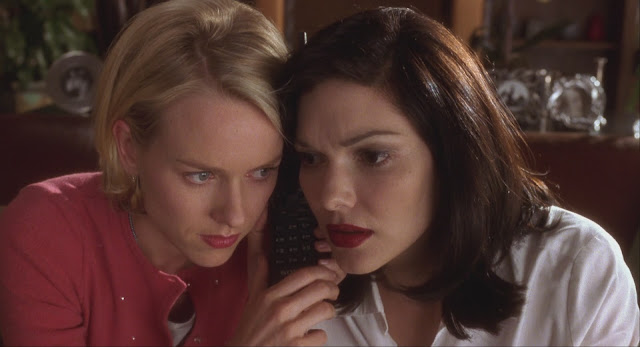WHY I LOVE MULHOLLAND DRIVE
"This is the girl."
Mulholland Drive, written and directed by David Lynch, was my introduction to that great artist. I didn't get it, at first. In fact, I found it quite frustrating and irritating. "What the hell is this?" I asked with all the smarts of a ham sandwich. When I come across those who struggle with the surreal and abstract world of David Lynch, I think back to this time, when I too was a dullard who couldn't grasp the dream logic that runs through much of his work. It was not until watching Twin Peaks for the first time, in 2004/2005 that I revisited Mulholland Drive. After being eased into the strange, dreamlike world of Lynch, and having let go of the need to have everything make literal/linear sense, Mulholland Drive was a revelation; a hidden world now open to me, having been within me all the time.
Mulholland Drive has been voted the greatest movie of the 21st Century, and for damn good reason. It is an astonishing, layered, supremely mysterious and masterful work of art. Featuring two of the greatest performances of all time from Naomi Watts and Laura Elena Harring, the film is one that will stay with you long, long after it finishes. Like the other two pictures in what I like to call David Lynch's "Dream Trilogy," there is a linear plot to be extracted, should one wish it, but to seek it as the main thing is to horrendously miss the point of the thing. Mulholland Drive is about the American Dream, the lure of Hollywood and the kind of love that utterly decimates the soul and body. It is a dream that is realer than waking life.
The set-up goes like this: Betty, played by Naomi Watts arrives in Hollywood, where she will try her luck as an actor. When she gets to her Aunt's apartment, she finds a woman there. This woman, calling herself Rita, soon reveals that she was in an accident and can't remember who she is. The rest of the movie flows from that point. Some people feel the need to pull the "real" plot of the movie out of the dream and say this really happened and that didn't, forgetting of course that in reality none of anything actually happened, at all. David Lynch sees movies as a shared dream, allowing us all to see our true selves through the characters on screen. It is the instinctual reaction to Mulholland Drive that matters most. It is the emotions that run through our heads when we see the mystery unfold on screen that show us the truth that has nothing at all to do with the "real" sequence of events.
Mulholland Drive is, to me, about regret most of all. Naomi Watts, an incredible actor, gives the performance of her career. The guilt that comes from destroying the thing she loved the most, and the knowledge that in turn, she has guaranteed her destruction too, is so powerful that it brings to mind all manner of personal regrets. The way her character changes throughout the movie is masterfully handled, and when things get dark, she plays it so real and so powerfully that it sticks in the mind for a long time after. That Watts wasn't nominated for an Oscar for her work here is absurd. On that subject, if there were an Oscar for a one scene performance then Patrick Fischler should surely have won, for his knockout and terror filled turn as a man who has a recurring nightmare that starts in a Winkie's diner. This scene works as a short film apart from the rest of the film, but also further feeds into the fear that runs through the film. The fear of non-existence. The erasure of not only your life, but of all life, of everything you ever loved. Oblivion.
The way that David Lynch examines the dream world and how it informs our waking life is something that greatly influenced the movie that followed: INLAND EMPIRE and the greatest work of his career, Twin Peaks: The Return. When we are having them, dreams are often as real as anything else. It is only when we awake from them that we realize that we were dreaming. While our dreams cannot be shared with others, films can be. Films are the way in which we can connect through ideas and thoughts and hopes that do not have a solid grounding in reality. In Neil Gaiman's Sandman comic book series, there is a story where someone becomes addicted to living inside of dreams, because their real life cannot compare. Eventually their body goes to rot, killing themselves due to an inability to deal with reality. There is some of that in Mulholland Drive too; a sense of Betty trying to right all the wrongs in her life, to give herself and her love, the life they deserve. In the end though, that is not enough.
Mulholland Drive, much like his first feature film, Eraserhead is in some ways a Horror movie disguised as something else. There are moments of true hopelessness and terror, all the more powerful for their being unconventional. The moment out the back of Winkie's is utterly horrifying, and the final moments of the picture are so bleak that it is hard to breathe comfortably. One of David Lynch's favourite films is Billy Wilder's masterpiece, Sunset Boulevard, and Lynch's picture has a fair lot in common with that great Film Noir. The corrosive nature of fame, and the corruption of innocence that comes with it. This is something that Lynch would further examine in INLAND EMPIRE. Mulholland Drive is a great place to start with David Lynch's surreal and abstract work, and very possibly his best. A paean to tragic love and dreams.




Comments
Post a Comment